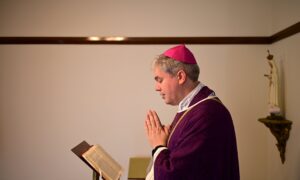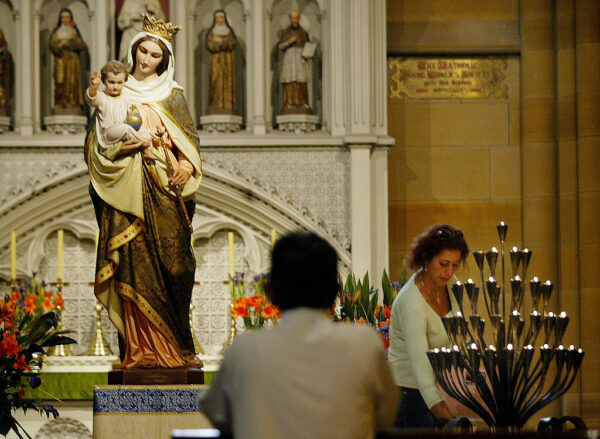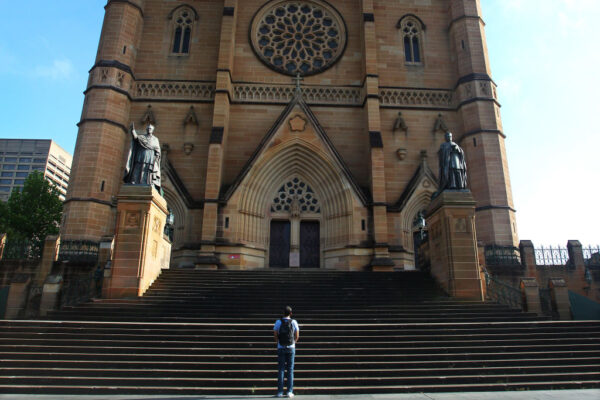In the State, We Trust
Commentary Easter Sunday is the traditional day for Christians to celebrate Jesus of Nazareth’s rising from the dead. However, there is no exaggeration in stating that Christianity is in existential decline in Australia, a country that is about to become a majority atheist nation. In Australia, according to a 2021 Australian community survey run by NCLS Research, half of all Australians believe Jesus is a fictional character who has never existed. According to NCLS director Ruth Powell, “this is perplexing, given the wide acceptance amongst historians that Jesus Christ was a real person who lived in first-century Palestine.” Not surprisingly, that same survey also found that only 22 percent of all Australians accept Jesus as “God in human form who lived among people in the first century.” “If the human existence of Jesus is not resolved for Australians, it is not surprising that there are differing views as to whether he was divine,” says Powell. But if Jesus is real, was he particularly special? Using results from the 2019 Australian Community Survey, 78 percent of Australians do not believe the resurrection of Jesus from the dead happened as described in the Bible. Of those who think that Jesus was a real person, only 29.3 percent believe he was “God in human form who lived among people in the first century.” Despite such ignorance of the historical evidence regarding the existence of Jesus, nearly six in ten Australians actually believe they are “familiar” with the teachings of Christ. Inverting Society Of course, a significant number of such people associate Christianity with a variety of negative stereotypes. According to Michael Quinlan, Dean of Law at the University of Notre Dame Australia, “Many [Australians] associate Christians with negative stereotypes such as being judgemental, opinionated, hypocritical, intolerant, insensitive, rude, greedy, with outdated beliefs that they seek to impose on others.” School students hold placards during a Climate School Strike protest at Treasury Gardens in Melbourne, Australia, on March 25, 2022. (AAP Image/Joel Carrett) Religious illiteracy can be described as a dangerous reality. And yet, according to Prof. Quinlan, it is a dangerous reality in contemporary Australia, where Christianity is both poorly understood and considered negatively by many Australians. Being indoctrinated for such a long time by their ruling elites, many Australians are now passionately opposed to Christianity. They not only associate Christianity with intolerance and bigotry but consider Christian beliefs outdated and a negative influence in society. This form of anti-Christian bigotry is now quite pervasive in our “secular” society. In some instances, Christian people and organisations can be legally punished for upholding traditional beliefs on matters of marriage and sexuality. According to Michael Sexton SC, the solicitor-general for New South Wales since 1998, the forces of political correctness in Australia are presently waging a deadly war on everything that is perceived as being inconsistent with their own “articles of faith.” Such individuals have developed “a hostility to all forms of the Christian religion but especially the Catholic Church,” Sexton says. Indeed, powerful secular opponents to Christianity in Australia often contend that “people of faith” should not be given licence to indulge in alleged acts of “hate speech” and “discrimination.” Such a radical view seems to assume that religious beliefs are intrinsically divisive, bigoted and irrational. It follows from such a premise that the expression of religious beliefs must be completely eradicated from the public square. According to law professor Keith Thompson, “There is an increasing demand in Australia that religious worship and expression should be confined to private space and that religious reasons for political decisions should be affirmatively excluded from debate in the public square.” A worshipper lights a candle while another prays inside St Mary’s Cathedral in Sydney, Australia, on April 1, 2005. (Rob Elliot/AFP via Getty Images) Holding True to Your Values Given the sort of vicious attacks Christians may suffer in this country for simply communicating their religious views, it is no wonder so many Australians are reticent to talk about their faith openly and in public. And yet, as Christ himself put it, “salt preserves, but if salt loses its saltiness, it is worthless” (Luke 14:34). We can only imagine how incredibly awful this world would be if the followers of Christ had decided to “privatise” their faith, thus making no impact on the life of their communities. Think, for instance, of that great advocate of freedom William Wilberforce (1759-1833), who became the voice of the anti-slavery movement in the British Parliament more than two centuries ago. Abraham Lincoln and Frederick Douglass spoke reverently of him as “the pioneer and father of the anti-slavery movement.”

Commentary
Easter Sunday is the traditional day for Christians to celebrate Jesus of Nazareth’s rising from the dead. However, there is no exaggeration in stating that Christianity is in existential decline in Australia, a country that is about to become a majority atheist nation.
In Australia, according to a 2021 Australian community survey run by NCLS Research, half of all Australians believe Jesus is a fictional character who has never existed.
According to NCLS director Ruth Powell, “this is perplexing, given the wide acceptance amongst historians that Jesus Christ was a real person who lived in first-century Palestine.”
Not surprisingly, that same survey also found that only 22 percent of all Australians accept Jesus as “God in human form who lived among people in the first century.”
“If the human existence of Jesus is not resolved for Australians, it is not surprising that there are differing views as to whether he was divine,” says Powell.
But if Jesus is real, was he particularly special?
Using results from the 2019 Australian Community Survey, 78 percent of Australians do not believe the resurrection of Jesus from the dead happened as described in the Bible. Of those who think that Jesus was a real person, only 29.3 percent believe he was “God in human form who lived among people in the first century.”
Despite such ignorance of the historical evidence regarding the existence of Jesus, nearly six in ten Australians actually believe they are “familiar” with the teachings of Christ.
Inverting Society
Of course, a significant number of such people associate Christianity with a variety of negative stereotypes.
According to Michael Quinlan, Dean of Law at the University of Notre Dame Australia,
“Many [Australians] associate Christians with negative stereotypes such as being judgemental, opinionated, hypocritical, intolerant, insensitive, rude, greedy, with outdated beliefs that they seek to impose on others.”

Religious illiteracy can be described as a dangerous reality. And yet, according to Prof. Quinlan, it is a dangerous reality in contemporary Australia, where Christianity is both poorly understood and considered negatively by many Australians.
Being indoctrinated for such a long time by their ruling elites, many Australians are now passionately opposed to Christianity.
They not only associate Christianity with intolerance and bigotry but consider Christian beliefs outdated and a negative influence in society.
This form of anti-Christian bigotry is now quite pervasive in our “secular” society. In some instances, Christian people and organisations can be legally punished for upholding traditional beliefs on matters of marriage and sexuality.
According to Michael Sexton SC, the solicitor-general for New South Wales since 1998, the forces of political correctness in Australia are presently waging a deadly war on everything that is perceived as being inconsistent with their own “articles of faith.”
Such individuals have developed “a hostility to all forms of the Christian religion but especially the Catholic Church,” Sexton says.
Indeed, powerful secular opponents to Christianity in Australia often contend that “people of faith” should not be given licence to indulge in alleged acts of “hate speech” and “discrimination.”
Such a radical view seems to assume that religious beliefs are intrinsically divisive, bigoted and irrational. It follows from such a premise that the expression of religious beliefs must be completely eradicated from the public square.
According to law professor Keith Thompson,
“There is an increasing demand in Australia that religious worship and expression should be confined to private space and that religious reasons for political decisions should be affirmatively excluded from debate in the public square.”

Holding True to Your Values
Given the sort of vicious attacks Christians may suffer in this country for simply communicating their religious views, it is no wonder so many Australians are reticent to talk about their faith openly and in public.
And yet, as Christ himself put it, “salt preserves, but if salt loses its saltiness, it is worthless” (Luke 14:34).
We can only imagine how incredibly awful this world would be if the followers of Christ had decided to “privatise” their faith, thus making no impact on the life of their communities.
Think, for instance, of that great advocate of freedom William Wilberforce (1759-1833), who became the voice of the anti-slavery movement in the British Parliament more than two centuries ago. Abraham Lincoln and Frederick Douglass spoke reverently of him as “the pioneer and father of the anti-slavery movement.”
When Wilberforce became a follower of Jesus, he had no idea how to reconcile his newly discovered faith with his life as a member of Parliament. Then a visit to John Newton, author of the hymn “Amazing Grace” and rector of a church in East London, solved the problem.
Wilberforce was encouraged by Newton to stay in Parliament and fight against oppression and for justice for all.
“Who knows,” said Newton, “whether God has not prepared [Wilberforce] for a time such as this”?

As noted by his principal biographer Eric Metaxas,
“Wilberforce wasn’t just ‘religious’ but actually had a personal relationship with God. He seems to have been motivated by love—love of God and the love of his fellow man—more than by a simple sense of right and wrong or justice and injustice. This is probably the single most important factor in what he was able to do.”
From a traditional Christian perspective, all this appears to be perfectly natural. After all, Jesus told his disciples to be “Salt and Light.”
This means that Christians should be their fellow human beings in every aspect of life, including law and politics.
With Freedom Comes Responsibility
Jesus taught his disciples not only to love one another but also to love even their enemies. He told them to pray for those who persecute them (Matthew 5:44).
This amazing “love command” is a critical foundation of the modern understanding of human dignity and basic human rights.
In “Render Unto Caesar,” Charles J. Chaput, the Catholic Archbishop of Philadelphia, explains that,
“For Christians, love is a small word that relentlessly unpacks into a lot of other words: truth, repentance, forgiveness, mercy, charity, courage, justice. These are action words, all of them, including truth, because in accepting Jesus Christ, the Gospel says that we will know the truth, and the truth will make us free (John 8:32)—not comfortable, not respected, but free in the real sense of the word: able to see and do what’s right. This freedom is meant to be used in the service of others. Working for justice is an obligation of Christian freedom.”
Although the ruling classes in this country may persist in their attempt to turn church-and-state separation into the separation of beliefs and politics, there is nothing in the Australian Constitution that legally justifies the suppression of religious discourse in the public square.
Nor is there anything in our Constitution that justifies the denial of equal freedom of political communication to every individual citizen—religious or not.
There are those who attempt to dictate what Christians can say in the public realm and treat some of the most fundamental aspects of their lives entirely as a private matter and as something that could disqualify them from political participation.
But such radical secularists in Australia are guilty of a form of anti-religious bigotry that steps away from democratic maturity.

Finally, perhaps as a result of the visible decline of Christianity in our society, I have noted how over the last few years, so many Australians have acquired an utterly distorted view of what governments can do for them.
Parodying our own Constitution, these Australians now “humbly beseech the blessings of the Almighty State.”
They worship at the altar of government, which they perceive as the ultimate provider of all things. Call it a form of idolatry if you wish.
And yet, when a society turns out to be so blindly committed to obeying government instead of “the rule of law,” there will be only arbitrary “rule by law,” although no free society can ever exist without government under the law.
Views expressed in this article are the opinions of the author and do not necessarily reflect the views of The Epoch Times.












